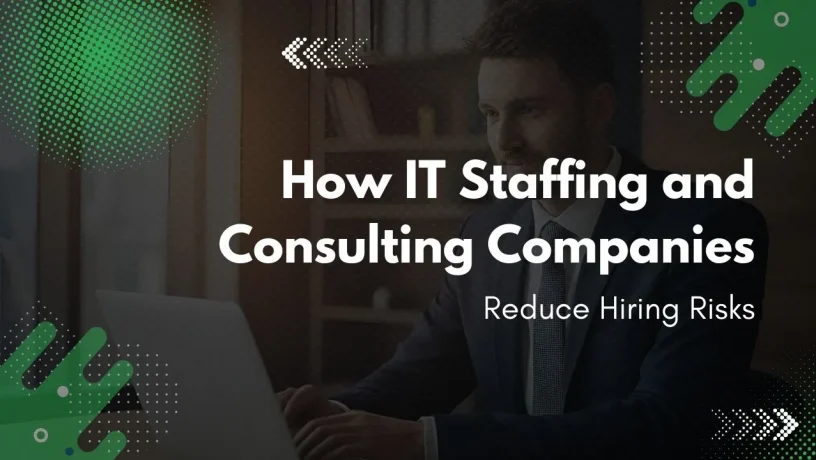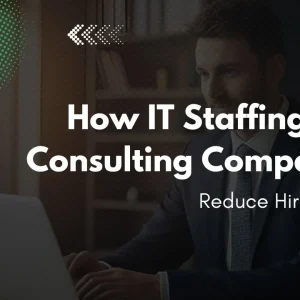How IT Staffing and Consulting Companies Reduce Hiring Risks?
Identifying the correct IT talent has become one of the most challenging tasks for modern organizations. In a recent report from SHRM, the average cost per hire for an open tech position can surpass $4,700, not including the indirect expenses of a “bad hire.” When you consider the rising complexities of IT roles, the need for speed, and to remain competitive, it becomes clear that hiring blunders are more costly than ever. As organizations strive to navigate these risks in order to achieve long-term sustainable growth, many are turning to IT Staffing and Consulting services for systemizing their employment procedures. The Issue with Traditional IT Hiring While internal recruitment may suffice in some situations, internal recruiting leaves a lot to be desired when an organization has a need for specialized IT skills or needs to scale quickly. In a world with slow and rigid hiring cycles, businesses are putting productivity on pause, waiting to fill roles. Misalignment between the job role and the actual skill of the hire happens all too often and leads to the loss of key personnel and lots of wasted time on retraining. As the pace of technology is changing faster than at any time in history, organizations simply cannot afford to miss out on opportunities in the market waiting to hire or onboard a candidate who is not well aligned to the role. Organizations must be positioning themselves to remain competitive, act quickly, and deploy the right talent. This is where the smart ownership of IT Outsourcing strategies becomes useful in breaking the mold of the legacy hiring model. What Is IT Staffing and Consulting? IT Staffing and Consulting is a workforce solution in today’s world; whereby external professional third-party experts provide vetted IT professionals to meet a company’s workforce and employment needs. These placement firms can fill both permanent roles, as well as varying types of temporary roles; including short-term projects, contract-to-hire, and even full-time employment modes. The utilization of IT Staffing and Consulting firms specialize in locating, screening, and qualifying candidates — often in a timeline quicker than traditional means. IT Staffing and Consulting companies specializes in providing companies with more than resumes. IT Staffing and Consulting firms make sure there is a good cultural fit, technical knowledge, and compliance — all of which are key to ensuring that the employee or candidates will not negatively hinder the company’s bottom line. Companies are hiring top talent without the pressure to source or manage the recruitment cycle on their own. The Unique Risks of Hiring in Tech Companies The risk that tech companies assume in hiring is unique to technology companies and their operations. Either they recognize and address the consequences, or they risk major damage to their company if the wrong hire becomes a time bomb within. The most notable example of hiring pitfalls is failure to consider the skill gap; in other words, hiring someone who does not have practical experience in a given platform or tool. No doubt this delay can trigger awful outcomes that cause considerable costs to the company. Cultural misfit is another danger for companies that coordinate global work teams. Even if employees are technically savvy, there still is no guarantee that they can work together without being able to learn the work culture of proper collaboration. There is still another consideration as to the harm of compliance issues or breach of data — especially true when candidates are exposed to sensitive systems or regulated data. All companies feel the risk, thus demanding that they find a smarter approach to hiring that goes beyond resumes and interviews. How IT Staffing and Consulting Firms Mitigate These Risks One of the primary benefits of using IT Staffing and Consulting firms is their ability to pre-screen talent not only on technical qualifications but also on soft skills. This upfront filtering reduces the odds of making a bad hire dramatically and greatly reduces wasted time on the hiring manager’s side. These firms have industry-specific experience. They know which certifications matter, which skills are obsolete, and what qualifies a candidate as “project-ready”. Also, they provide hiring agility — which is a valuable ease, whereby businesses can rapidly ramp up or ramp down their teams based on project needs. While it is sometimes a bonus (and in certain instances, a necessity) to minimize the cycle of recruitment, the ability to backfill roles – and do so promptly – is one of the most compelling reasons to use IT Staffing and Consulting firms, avoiding a timeline delay to the project. These firms also typically have a global network of candidates – allowing businesses to access a larger talent pool and not be tied to regionally based talent. This is even more valuable in IT Outsourcing scenarios where geographically distributed talent creates a competitive advantage. Advantages Compared to Traditional Hiring There are both operational and financial benefits to IT staffing and consulting beyond just standard hiring. 1. Reduction in Administrative Costs Companies do not need to spend time writing job descriptions or going through multiple interviews and background checks. 2. Less Risk in Legal and Regulatory Areas In staffing, the provisioner takes care of compliance with tax rules and regulations as well as employment laws, so businesses do not take on the legal obligation. The flexibility of business-focused staffing is the ability to offer various methods of “hiring” to accommodate specific business conditions. 3. Common Business Models for Hiring Leading providers of IT staffing and consulting solutions know that it is essential to have multiple engagement models. 4. Contract Staffing: Best suited for temporary, short-term needs, projects or urgent business needs requiring an immediate solution. 5. Dedicated Team Model: An entire staff with full-time professionals serves as an extension of your internal team with focus, engagement, and consistency. 6. Direct-Hire: Organizations can engage people in permanent positions in a direct-to-hire model to avoid the time and complexity of the hiring process.




